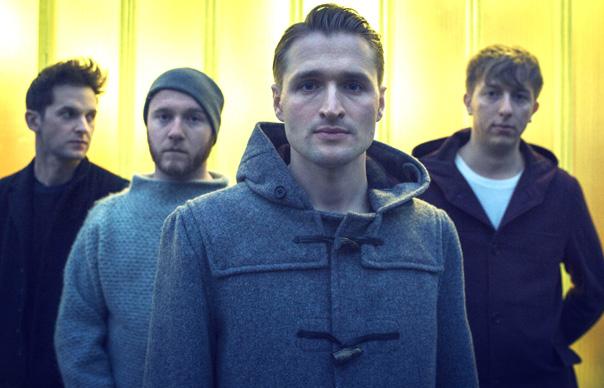Synths and sex... the Kendal clan's excellent fourth...
“Please be wary / The pit of a man’s heart is dark and scary,” advised Hayden Thorpe on one of Wild Beasts’ earliest compositions, an extraordinary, teetering, football-themed melodrama called “Woebegone Wanderers” that eventually graced their 2008 debut album
Synths and sex… the Kendal clan’s excellent fourth…
“Please be wary / The pit of a man’s heart is dark and scary,” advised Hayden Thorpe on one of Wild Beasts’ earliest compositions, an extraordinary, teetering, football-themed melodrama called “Woebegone Wanderers” that eventually graced their 2008 debut album
Wild Beasts remain pretty much out a limb as band who regularly entertain the topic of male lust and its sometimes terrible consequences. It’s difficult to think of many singers of their generation who would dare to adopt the role of a gloating Don Juan with such menacing relish as Tom Fleming does here on “Nature Boy”, working a catchphrase borrowed from wrestler Jake “The Snake” Roberts – “” – into a narrative that points up the destruction wrought by the myth of the alpha male.
Their previous album, 2011’s Smother, felt a little frigid (in both senses), so it’s good to see the colour returning to their cheeks. Present Tense finds a more acceptable compromise between their passionate urges and their modest temperaments. Fleming’s fellow vocalist Hayden Thorpe has long since tamed his more rococo lyrical flourishes but, encouragingly, much of the fervour that fuelled the likes of “The Fun Powder Plot” has returned. Steely opening track “Wanderlust” is a trenchant takedown of careerist rockers with nothing to say, concluding with a sideswipe at those who adopt American accents in order to get on: “In your mother tongue, what’s the verb ‘to suck’?”
Thorpe’s voice is still a swooping, exotic pleasure, fuller and more controlled than in the early days, only dominating the picture when absolutely necessary. Fleming’s is charming, cautioning, the keeper of dangerous knowledge. His songs, such as “Daughters” and “A Dog’s Life”, are ominous affairs, full of dark imagery, ulterior motives and dire consequences. Thorpe tends to handle the more tender, romantic stuff, such as “A Simple Beautiful Truth”, a gorgeous grown-up funk smoulderer, and “Palace”, a soaring, heart-on-the-table love song. “Sweet Spot” is an eloquent paean to orgasm, the moment of ecstasy described as “a godly state/ Where the real and the dream they consummate”.
Musically, it’s as if Wild Beasts heard Jon Hopkins and Oneohtrix Point Never’s stunning remixes of their own “Two Dancers” and thought: we could probably do all that ourselves. Synthesisers dominate, but there is none of the metallic harshness that implies. Nor is there any of the diffuse bluster often created when sensitive guitar bands attempt to bolster their sound with electronics. With the aid of producers Alex Dramgoole AKA Lexxx and Eno protégé Leo Abrahams, Wild Beasts have meticulously selected only the richest, most evocative synth tones with which to reconstruct their distinct soundworld. Benny Little’s patient, eddying guitar figures haven’t been jettisoned, but subsumed seamlessly into the new order; or, as on “A Dog’s Life”, employed to provide exultant relief from the chorus’s menacing machine drone. As a result, Present Tense never sounds alien or abrasive, but intimate, eerie and seductive. Its antecedents are Sylvian & Sakamoto, side two of Kate Bush’s Hounds Of Love and particularly The Blue Nile, Fleming’s vocal line on “New Life” assuming more than a hint of Paul Buchanan’s sad, rain-lashed majesty.
But mostly, Wild Beasts still sound like nobody else but themselves. For the fourth album in a row, they’ve moved the goalposts, challenging themselves to apply their whooping idiosyncrasies to a new aesthetic framework. On Present Tense they’ve done so with such exquisite attention to detail, you can’t help but submit to their advances.
Sam Richards
Q&A
Tom Fleming
Were there a few favourite pieces of kit that ended up dictating the sound of this album?
We don’t have loads of synthesisers: a Roland Juno-6, a Prophet 08 – which is a lovely thing and all over the record – and we had access to a working Jupiter-8. But equally we did a lot with the Roland 404 sampler, a little tabletop thing that looks a Game Boy. Obviously we’re interested in sound and we tried to get things right because in electronic music the style is the substance to some extent; you have to take care over these things. But ultimately we’re not really programmers – we like things we can hit.
Your song “Nature Boy” seems to allude to various myths about male sexual potency. Were you thinking of anything specific when you wrote it?
It’s a play on all kinds of macho-ness: the blues song Back Door Man, the old myth of Reynard The Fox, and also WWE wrestlers and rappers – “I’m the peacock”, that kind of thing. “Nature Boy” is about the archetype of man’s conquering sexuality.
Sex and sexuality is certainly a recurring topic in Wild Beasts in lyrics, so why do you think most of your peers are scared to broach the subject?
It’s weird. Indie bands, for want of a better term, don’t like to talk about sex. Probably because it’s difficult to come across convincingly. Bearing in mind that chat about sex is everywhere in our daily lives, but none of it’s actually
In hindsight, do you think maybe you went a bit too far on Smother in trying to counteract the ribaldry of the first two albums?strong>
Potentially. I think that record needed to be made, otherwise we could have found ourselves stereotyped as this oddball, sexual indie band, so it was a very deliberate rejection. But this new record definitely had to be a bit more aggressive. We wanted to sound like a gang again.
INTERVIEW: SAM RICHARDS
Photo credit: Klaus Thymann



